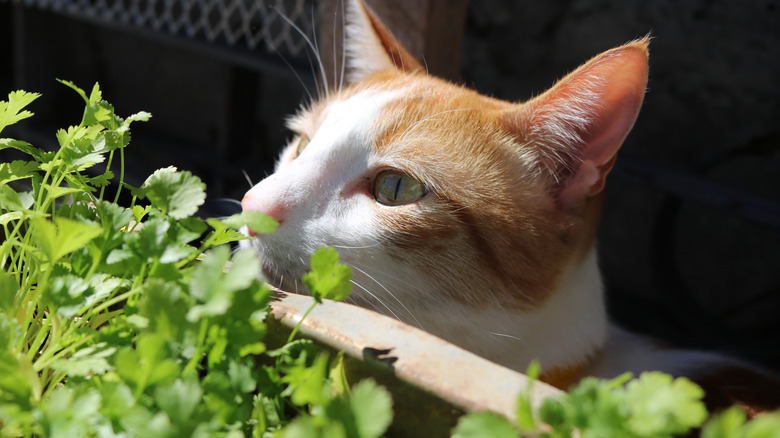Why You May Want To Reconsider Using Ultrasonic Pest Repellents To Keep Cats Out Of The Garden
When you spend a lot of time and hard work developing your garden, pruning your bushes, and weeding out the stranglers, the last thing you want to see is a cat lurking or urinating near the plants. You may have heard that an ultrasonic pest repellent can deter cats, but they have their limits. While you could purchase one and see fewer outdoor cats in your garden bed, the device may only work on some of the felines and may only keep them away until they learn there's no actual risk.
To keep cats out of your yard and garden, ultrasonic repellents emit a high-frequency sound that cats typically do not like. Usually, that noise is hard for people to hear but it is high-pitched enough to make it troublesome for cats, along with rodents and other pests as well. This makes it a pest repellent that encourages the cat to go in a different direction, keeping them far away from your hard work. They can also startle the cat, which makes the feline less likely to want to be in that area. Yet, as well as they seem to work, these devices have significant limitations, including that some cats may not respond to them or they may not work for very long.
Why ultrasonic pest repellents may not keep cats away
By creating a sound with a frequency that ranges from 20 to 65 kilohertz, ultrasonic pest repellers can scare cats away from an area. This sound is so high-pitched that humans can't hear it, but it is enough to startle the pests away from your garden. Typically, the device will kick on when there's motion in the area. As a result, it only activates when a cat is close enough to trip the sensor. The sudden onset of the sound should scare them away without harming their hearing or the cat in any other way.
Overall, ultrasonic pest repellents can work to scare away the cats present — but only for a short while. The felines may learn that the sound does not mean there is imminent danger, which could then make the device ineffective. That's likely to occur over a few times of use. The other concern is that many older cats lose their hearing, which means that if you have senior cats in your yard, they are less likely to be controlled by these sounds. Also, not all ultrasonic pest repellers have motion sensors, as some need to be triggered with a remote when you see a cat present. That makes them less helpful for those who find that damage is caused in the middle of the night or those who don't watch their garden for long periods of time.
How to make ultrasonic pest repellents more helpful
There are a few things you can do to make ultrasonic repellents at least a bit more helpful for deterring cats. Start with selecting one that is motion-activated and has built-in flashing lights or other sounds. Those who change up the type of response they create are likely to be more effective overall. Some also allow you to adjust the tone to different frequencies. This doesn't harm the animal or your hearing, but it can be enough of a change to keep the cat from becoming too used to it. Another strategy to get the most out of an ultrasonic repeller is to change the location often. If you notice that the device has been effective in one area but is too far away from another cat entrance to be useful, move it to that location. This type of change may be enough to continue to ward them off from multiple locations at once.
Overall, ultrasonic repellents can work to keep cats and other pests out of your garden, but they may not get all of the felines out of your yard. If there's a colony of ferals that have found your yard to be an ideal home, the only way to get the unwanted stray cats to move on is to eliminate food sources and maintain more of a presence outside. Yet, in all reality, both feral and domesticated cats seem to do as they please.


